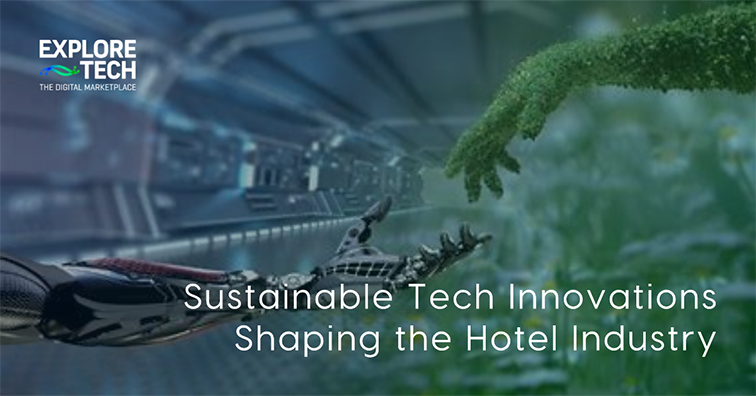
As the hospitality industry evolves, sustainability has become a critical focus, driven by increasing environmental awareness and a demand for greener practices. The rise of eco-friendly innovations and green technology marks a significant shift towards reducing the industry's carbon footprint, improving energy efficiency, and promoting sustainable practices. This movement not only aims to minimize environmental impact but also enhances guest satisfaction by aligning with their values on sustainability.
In this article, we'll explore key sustainable technologies in the hotel industry, examine how green technology can enhance hotel operations, discuss best practices and challenges for implementation, showcase real-world success stories, and look at future trends in sustainable hospitality.
Key Sustainable Technologies in the Hotel Industry
Energy Efficiency Systems
Implementing Smart Energy Management Systems
One of the cornerstones of sustainable hotel operations is the integration of smart energy management systems. These systems use advanced technology to monitor and control energy consumption, ensuring that energy is used efficiently. By utilizing sensors and automation, hotels can reduce energy waste and optimize heating, ventilation, and air conditioning (HVAC) systems. This results in significant cost savings and a lower environmental impact.
Benefits of Energy-Efficient Lighting and Appliances
Energy-efficient lighting and appliances are crucial components in enhancing a hotel's energy efficiency. LED lighting, for instance, uses up to 75% less energy than traditional incandescent bulbs and has a longer lifespan. Similarly, Energy Star-rated appliances consume less electricity and water, contributing to both cost savings and reduced environmental impact. These upgrades not only align with green technology goals but also offer a tangible return on investment.
Renewable Energy Sources
Solar Panels and Wind Turbines for Energy Generation
The adoption of renewable energy sources such as solar panels and wind turbines represents a significant advancement in sustainable hospitality. Solar panels convert sunlight into electricity, providing a clean and renewable energy source that can reduce a hotel's reliance on non-renewable energy. Wind turbines, though less common, can also generate substantial amounts of power, particularly in areas with high wind speeds. Both technologies contribute to reducing a hotel's carbon footprint and promoting sustainable energy practices.
Reducing Reliance on Non-Renewable Energy
Transitioning to renewable energy sources helps hotels decrease their dependence on fossil fuels, which are a major contributor to greenhouse gas emissions. By investing in renewable energy infrastructure, hotels can not only lower their operational costs but also position themselves as leaders in sustainable practices within the hospitality industry.
Waste Reduction Technologies
Systems for Waste Recycling and Reduction
Waste reduction is another key area where technology can make a significant impact. Advanced waste recycling systems can separate and process various types of waste, reducing the amount sent to landfills. Technologies such as waste compactors and automated sorting systems enhance recycling efficiency and support a circular economy.
Benefits of Composting and Waste-to-Energy Solutions
Composting organic waste and converting it into useful products such as fertilizers or energy can dramatically reduce a hotel's environmental impact. Waste-to-energy solutions, which involve converting waste into renewable energy, provide an alternative method for managing waste and generating power. These technologies help hotels achieve zero-waste goals and contribute to sustainable operations.
Enhancing Hotel Operations with Green Technology
Green Building Practices
Use of Sustainable Materials in Construction
Sustainable building practices involve using eco-friendly materials that minimize environmental impact. Examples include recycled materials, low-VOC (volatile organic compounds) paints, and sustainable wood products. These practices not only contribute to greener construction but also improve indoor air quality and overall guest comfort.
Benefits of LEED Certification and Green Architecture
LEED (Leadership in Energy and Environmental Design) certification is a widely recognized standard for green building practices. Hotels that achieve LEED certification demonstrate a commitment to sustainable design, energy efficiency, and environmental stewardship. Green architecture principles, such as maximizing natural light and optimizing building orientation, further enhance a hotel's sustainability profile.
Eco-Friendly Amenities
Providing Biodegradable and Reusable Amenities
Eco-friendly amenities, such as biodegradable toiletries and reusable guest supplies, play a crucial role in reducing a hotel's environmental impact. By offering products that decompose naturally or can be reused, hotels can minimize waste and promote sustainability among guests.
Benefits of Eco-Friendly Guest Supplies
Eco-friendly guest supplies, such as bamboo toothbrushes and refillable water bottles, contribute to a hotel's sustainability efforts while enhancing the guest experience. These amenities align with the growing trend towards responsible travel and demonstrate a hotel's commitment to reducing environmental impact.
Water Conservation Techniques
Smart Water Management Systems
Water conservation is a critical aspect of sustainable hotel operations. Smart water management systems use sensors and data analytics to monitor and optimize water usage, identifying areas where conservation measures can be implemented. This technology helps reduce water waste and lower operational costs.
Benefits of Low-Flow Fixtures and Water Recycling
Low-flow fixtures, such as faucets and showerheads, significantly reduce water consumption without compromising performance. Additionally, water recycling systems, which treat and reuse greywater for non-potable purposes, further enhance water conservation efforts. These technologies contribute to sustainable practices and support environmental responsibility.
Implementing Sustainable Tech: Best Practices and Challenges
Best Practices for Implementation
Best Practices for Implementation:
Identifying areas for green tech integration, training staff on sustainable practices, and collaborating with eco-friendly vendors are critical steps in implementing sustainable technology. Equally important is the effective integration of IT systems to ensure streamlined operations and accurate data management.
Insight from Industry Experts
The integration of IT systems in hotels, particularly the Property Management System (PMS), Central Reservation System (CRS), and Customer Data Management (CDM), is crucial for achieving sustainable success in the hospitality industry. As highlighted in a recent white paper by dailypoint, hotels must move beyond outdated IT stacks and embrace a more interconnected approach to harness the full potential of digitalization. This integration not only improves data accuracy but also enhances the ability to provide personalized guest experiences, a necessity for staying competitive in today’s market.
By ensuring that your IT systems are well-integrated, hotels can better manage their sustainability efforts, providing a more cohesive and effective approach to both operations and guest engagement.
Read more: dailypoint’s triangle for sustainable success PMS – CDM – CRS
Identifying Areas for Green Tech Integration
Successful implementation of green technology begins with identifying key areas where improvements can be made. Conducting an energy audit, assessing waste management practices, and evaluating water usage are essential steps in determining where green tech solutions can be integrated.
Training Staff on Sustainable Practices
Educating and training staff on sustainable practices is crucial for the successful adoption of green technology. Staff members should be aware of the benefits of green tech and how to use it effectively. Regular training sessions and ongoing education can help reinforce sustainable practices and ensure compliance.
Collaboration with Eco-Friendly Vendors and Partners
Partnering with vendors and suppliers who share a commitment to sustainability can enhance a hotel's green technology initiatives. Collaborating with eco-friendly vendors ensures that the products and services used align with the hotel's sustainability goals.
Challenges and Solutions
Overcoming High Initial Costs of Green Tech
One of the main challenges in adopting green technology is the high initial investment. However, the long-term savings on energy, water, and waste management often offset these costs. Financial incentives, grants, and rebates may also be available to help mitigate the initial expenditure.
Ensuring Regulatory Compliance
Navigating regulatory requirements for green technology can be complex. Staying informed about local regulations and industry standards is essential for ensuring compliance. Working with experts and consultants can help address regulatory challenges and ensure that green tech solutions meet all necessary criteria.
Managing Guest Expectations for Sustainability
Guests increasingly expect hotels to adopt sustainable practices. Communicating the hotel's commitment to sustainability through marketing materials and guest interactions can help manage expectations and enhance satisfaction. Transparency about green initiatives and their benefits can also build trust with guests.
Insight from Industry Experts
As the hospitality industry continues to evolve, understanding the motivations of today's eco-conscious travelers is crucial. According to insights shared by Cendyn, "Today's travelers are not just seeking comfort and luxury; they are driven by a deeper commitment to sustainability. As they become increasingly aware of their ecological footprints, they actively choose accommodations that reflect their environmental values. This shift towards eco-conscious travel means that hotels must not only adopt green technologies and practices but also transparently communicate their sustainability efforts. By integrating comprehensive, authentic eco-friendly initiatives and clearly showcasing these efforts, hotels can attract and retain a growing segment of responsible travelers who prioritize both their personal experience and the impact they have on the world."
This perspective underscores the importance of aligning hotel practices with the values of modern travelers and highlights the need for transparent communication about sustainability efforts.
Read more: Cendyn’s ultimate guide to effectively market your hotel's sustainability efforts
Real-World Applications and Success Stories
Case Studies
Examples of Successful Green Tech Implementations in Dubai and UAE Hotels
Hotels in Dubai and the UAE are leading the way in green technology adoption. For example, the Armani Hotel Dubai has implemented a range of sustainable practices, including energy-efficient lighting, water conservation measures, and waste reduction initiatives. The Address Boulevard has also adopted green technology, such as solar panels and smart energy management systems, resulting in significant energy savings and enhanced guest satisfaction.
Benefits Seen in Energy Savings, Waste Reduction, and Guest Satisfaction
The implementation of green tech solutions has led to notable benefits, including substantial energy savings, reduced waste, and improved guest satisfaction. Hotels that invest in sustainable technologies often see a positive impact on their operational efficiency and reputation.
Green Tech Solutions
Range of Tools and Strategies for Implementing Green Technology
There are numerous tools and strategies available for implementing green technology in hotels. From energy management systems to waste recycling solutions, hotels can choose from a wide range of options to enhance their sustainability efforts.
Managing and Maintaining Sustainable Operations
Effective management and maintenance of sustainable operations are crucial for long-term success. Regular monitoring, performance assessments, and continuous improvements help ensure that green tech solutions remain effective and contribute to the hotel's sustainability goals.
Future Trends in Sustainable Hospitality
Emerging Green Technologies
Innovations in Energy Storage and Smart Grids
The future of sustainable hospitality will likely see advancements in energy storage and smart grid technology. Innovations in battery storage and grid management can enhance the efficiency and reliability of renewable energy sources, further supporting sustainable operations.
Future of Renewable Energy Integration
As renewable energy technologies continue to evolve, hotels will have more opportunities to integrate these sources into their operations. The growth of solar, wind, and other renewable energy solutions will drive further advancements in sustainable hospitality.
Sustainable Tourism Growth
Trends in Eco-Friendly Travel and Sustainable Tourism
Eco-friendly travel and sustainable tourism are gaining traction as travelers seek greener options. Hotels that embrace sustainable practices and promote eco-friendly travel options will be well-positioned to attract environmentally-conscious guests.
Benefits of Promoting Sustainable Travel Options
Promoting sustainable travel options helps hotels align with global sustainability trends and meet guest expectations. By offering green alternatives and highlighting their commitment to sustainability, hotels can enhance their appeal and support the growth of sustainable tourism.
Innovation in Environmental Sustainability
AI and IoT in Environmental Monitoring and Management
Artificial intelligence (AI) and the Internet of Things (IoT) are playing an increasingly important role in environmental monitoring and management. These technologies provide real-time data and insights, enabling hotels to optimize their sustainability efforts and respond to environmental challenges more effectively.
Future of Smart, Eco-Friendly Hotel Designs
The future of hotel design will likely feature smarter, more eco-friendly solutions. Innovations in building materials, energy systems, and guest amenities will continue to drive the evolution of sustainable hospitality, offering new ways to enhance environmental responsibility.
The green tech revolution is transforming the hotel industry, offering innovative solutions to enhance sustainability and reduce environmental impact. By adopting energy-efficient systems, renewable energy sources, and waste reduction technologies, hotels can

ExploreTECH Content Team
admin

